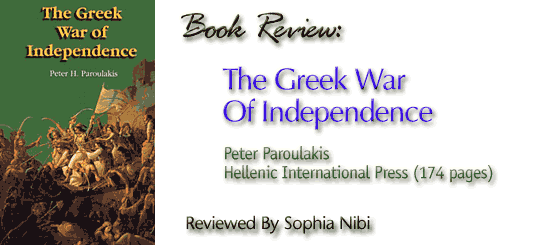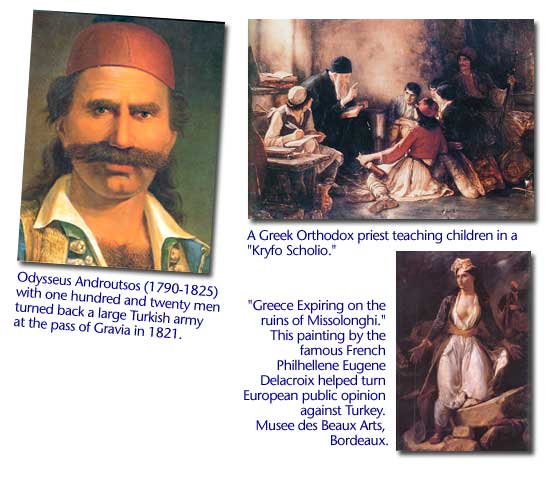 |
||||||
 |
||||||
A few years ago I visited the Peleponnese for the first time. I walked on the grounds of holy and historic places I had only heard about, places such as Kalavryta and the Monastery of Aghia Lavra. Friends took me to Koroni on the southernmost tip of the western Peleponnese, where I had an experience I will never forget. I visited a Kryfo Scholio! (Somehow, "Secret School," while an accurate translation, does not evoke the same feelings). I went down the many steps and looked up to the small opening through which the "lambro fengaraki" (bright little moon) illuminated the ground below. And for a fleeting moment, remembering what I learned as a child first in Athens, Greece, and then in Brooklyn, New York, I saw a moonlit classroom, the Priest-teacher surrounded by wide-eyed children learning in whispers about Orthodox Christianity and Hellenic Culture, the priceless twosome that is our heritage. Connecting with the past, I felt appreciative. Every year, we Americans of Greek descent celebrate March 25th, as do Hellenes and Philhellenes around the world. This year, my personal appreciation of the dual holiday has been much enhanced because I read an enlightening book, in English, well-researched and beautifully illustrated. Available at the Hellenic College-Holy Cross Bookstore in Brookline, MA, The Greek War of Independence by Peter H. Paroulakis is a thorough and comprehensive 174-page tome on the 1821 War which ended the 400-year Ottoman Turkish occupation of Greece. It will ensure that future generations in the English speaking world will learn about and appreciate the value of the 1821 Greek War of Independence and its significant role in world history. It is a book that should be in the library of every Greek-American home. In words and colorful illustrations (from the National Art Gallery the National Historical and Benaki Museums in Athens; the British Museum; the Louvre; and the Musee des Beaux Arts in Bordeaux), Peter Paroulakis brings to focus the people and situations which led to the 1821 War. He describes the heroic battles and the heroism of the Greek nation. He depicts the cruel centuries of Turkish occupation and oppression. He analyzes the causes of the War of Independence and gives a vivid and graphic description of the bitter struggle that gave birth to the modern Greek nation. He writes of the heroism of Grigorios Dikaios (also known as Papaflessas), Athanasios Diakos, Theodoros Kolokotronis, Yannis Makriyannis, Petrobey Mavromichalis, George Karaiskakis, and Andreas Miaoulis, to name just a few. And he enables the reader to visualize the Massacre of Chios, the Battle of Phaleron, the Exodus of Missolonghi, the Escape from Psara, and much more. Peter H. Paroulakis also introduces his readers to the many Philhellenes who came to the aid of the freedom-loving Greek nation: men such as American Samuel Gridley Howe, M.D., Brown University Class of 1821, who, like so many, was stirred by the Greek revolution against the Ottoman Turks. In 1824, shortly after earning his medical degree from Harvard, he sailed for Greece to volunteer as soldier and surgeon in the war and was eventually made surgeon-in-chief to the Greek navy. Other notable Philhellenes included Lord Byron; General Sir Richard Church, commander-in-chief of Greek forces from 1827 to 1829; Admiral Codrington, commander of the Allied fleet at the Battle of Navarino; French Philhellene Colonel Charles Fabvier, famous for leading a daring relief force into the Acropolis during the siege of 1826. As we know, and as we hope our children, grandchildren, and great-grandchildren will know, Bishop Germanos made the proclamation of the revolution on March 25, 1821 in St. George's Square in Patras. It was no coincidence that the day was also the Feast of the Annunciation. for, as Peter Paroulakis writes, "most significant in the preservation of the Greek spirit was the dedicated work of the Greek Orthodox Church...Throughout Greece in the liturgy and sermons of the churches, and in countless secret schools conducted at night...the local priests of the Greek Orthodox Church taught their faith and spoke the Greek language...The Greek nation and Greek people everywhere owe an immense debt to these thousands of dedicated men of the Church. Their faith, devotion and courage paved a road to freedom, independence and the eventual acquisition of religious and civil rights which would no longer depend on the arbitrary whim of a foreign despot." Peter Paroulakis, an Australian of Greek and English ancestry, surely knows, as we Greek Americans know, that Hellenism in foreign lands has survived and is greatly appreciated in the community-at-large because of the efforts of the local Hierarchy, Priests and faithful laymen of the Church, who labor together to preserve a respected and admired heritage, one brought to this nation by the Greek immigrants who sacrificed much and taught their children and grandchildren to love and respect America but never to forget their noble roots. My late maternal grandmother, whose first name I bear and who was born in Turkey, never celebrated her name day. She waited for the church of Aghia Sophia to be restored to her old glory and, once again, become a Greek Orthodox house of worship! In the first chapter of The Greek War of Independence Peter Paroulakis describes the fall of Constantinople. He quotes a folk poem which tells how when the liturgy was cut short tears ran from the icon of the Holy Virgin at St. Sophia. "Dry your eyes Holy Lady, let them not be filled with tears. All again will belong to us with the passing of the years." Reading it, I had to dry my tears because a version of this little poem was my grandmother's favorite. Peter H. Paroulakis was born in Perth, Western Australia. He is a graduate in Law from the University of Melbourne, and was for several years Honorary Consul of Greece in the Northern Territory of Australia. He has written several novels and screenplays under the pseudonym of Harold Nelson and specializes in modern Greek history. While in Boston, Peter Paroulakis is visiting various parishes in the Diocese, where he autographs his book which has been called "a precious contribution." The Greek War of Independence, by Peter H. Paroulakis, is available at Hellenic College-Holy Cross Bookstore, 50 Godard Avenue, Brookline, MA 02491. |
||||||
 |
||||||
|
||||||
